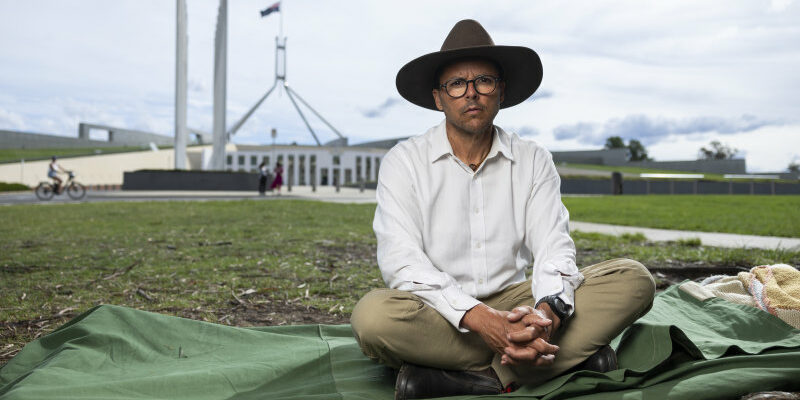Save articles for later
Add articles to your saved list and come back to them any time.
Two years ago, Gregory Andrews was Australia’s high commissioner to West Africa. Now he’s contemplating his mortality on the lawns of Parliament House with a determination to see out his hunger strike for urgent climate action to its ultimate conclusion.
“I don’t want to die, but I do want the Australian government and [Prime Minister] Anthony Albanese to show courage, and for [Opposition Leader] Peter Dutton to stop using climate change as a political weapon for his own advantage,” he says.
Gregory Andrews is entering the third week of his hunger strike in front of Parliament House in Canberra for stronger action on climate change.Credit: Alex Ellinghausen
Against the warnings of his doctor, but with the support of his wife and two adolescent children, the career bureaucrat and Indigenous man Andrews has lost more than eight kilograms. He drinks water but stopped eating on November 1.
Andrews – Australia’s first-appointed Threatened Species Commissioner and the nation’s deputy chief climate negotiator to the United Nations – started planning the hunger strike a few months ago. His despair over the impacts of global warming and weak environmental protections had spiralled into depression, and he knew he needed to do something to drive change.
“I’m lying here in a swag in front of Parliament House, but I feel like I have more power than I’ve ever had in my life,” he said.
“I may or may not be able to stop dangerous climate change, but at least in my heart, I’ll feel better for having tried.”
“I’m a bit worried that I might have a heart attack or something because my heart is a little bit dodgy … but I’ve gone this far now, and I feel like I’m forcing the government to be accountable.”
Andrews is making five demands of the government – to cease public funding for the fossil-fuels sector, phase out coal and gas exports, reform environment laws, ban logging of native forests, and release details of the government’s climate risk assessment.
All are politically controversial, but he says they are all science-based and achievable with current technology. His motivation is to safeguard the future of the planet from escalating climate change.
“Australia is the third-largest fossil fuel exporter in the world … we have to take responsibility for that.”
Australia has signed up to the Paris Agreement on Climate Change, which commits countries to action that limits global warming to as close to 1.5 degrees as possible. The Albanese government’s current climate target is consistent with international efforts leading to warming of more than 2 degrees.
Independent politicians have visited Andrews, including David Pocock, Allegra Spender and Sophie Scamps – a general practitioner who asked Andrews to quit his hunger strike for his health and urged him to work with her to drive change.
No government members of parliament have spoken to him – yet. But Andrews is determined to cut through, and he has a track record of sticking to his principles.
He quit his employment with the public service at the end of 2021 after returning from his post at the High Commission in Ghana in “disgust” at Australia’s promotion of fossil-fuel industries.
Andrews spends most of his days alone, prone in a swag stretched out on the sprawling lawns in front of Parliament House surrounded by a swirl of protesters who bus into Canberra to promote various causes.
He would be moved on by police if he tried to maintain his vigil overnight so goes home to sleep at sundown, and returns at sunrise each day.
“I don’t really know how it’s going to end,” Andrews said.
“I know that I won’t give up unless the Australian government gets serious about climate change or my body gives up.”
Cut through the noise of federal politics with news, views and expert analysis from Jacqueline Maley. Subscribers can sign up to our weekly Inside Politics newsletter here.
Most Viewed in Politics
From our partners
Source: Read Full Article

